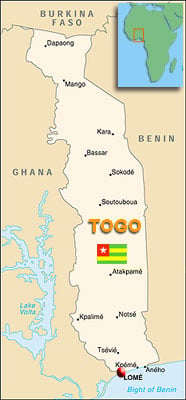The agreement marks the resumption of the EU’s cooperation with Togo after it had suspended it in 1993 over Lome’s failure to implement political reforms.
The decision coincided with the signature on Sunday of an accord between the Togolese government and opposition parties to end a 12-year political stalemate that had severely damaged Togo’s economy. Political tension also touched off unrest following disputed presidential elections last year that sent thousands of people fleeing across the border.
The EU funds come from the Framework of Mutual Obligations (FMO Stabex) to improve the living conditions of rural populations in countries heavily dependent on agriculture. Grants are released to boost development or compensate for a loss in export revenues due to external causes such as natural disasters or sudden drops in world market prices.
Cooperation Minister Gilbert Bawara said the funds would benefit the coffee, cocoa and cotton industries, as well as help improve the roads and water infrastructure in rural areas.
The revitalisation of the cotton industry and the upgrade of road networks are intimately linked in Togo. Cotton, which is cultivated in most areas of the country, is the main source of income of many Togolese, but the poor condition of roads hampers the transport of goods destined for export.
The Stabex funds will also be used to “diversify [the Togolese economy] to prevent the country from being dependent on one or two products only,” said Dzigbondi Bouaka, the national coordinator of FMO Stabex.
Filiberto Sebregondi, head of the EU delegation in Lome, said Togo would be included in the 10th European Development Fund programme cycle with a view to support economic development and social justice.
jg/vj/cs
This article was produced by IRIN News while it was part of the United Nations Office for the Coordination of Humanitarian Affairs. Please send queries on copyright or liability to the UN. For more information: https://shop.un.org/rights-permissions





